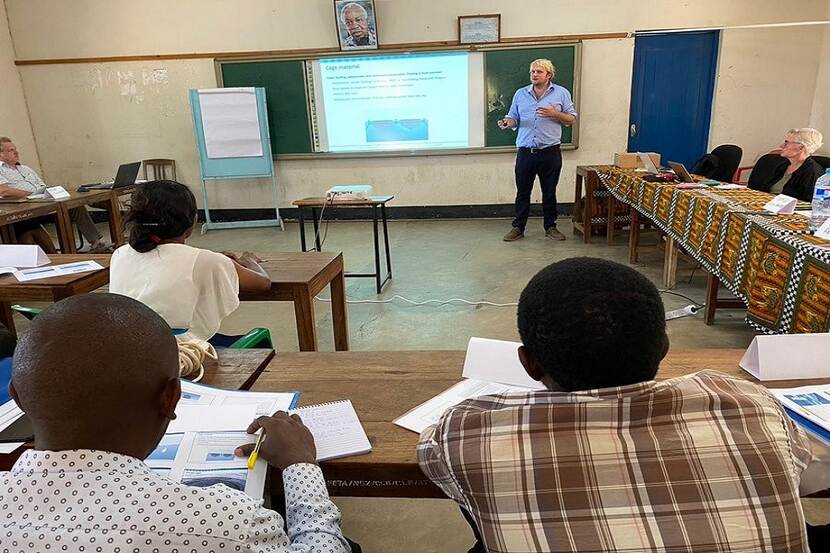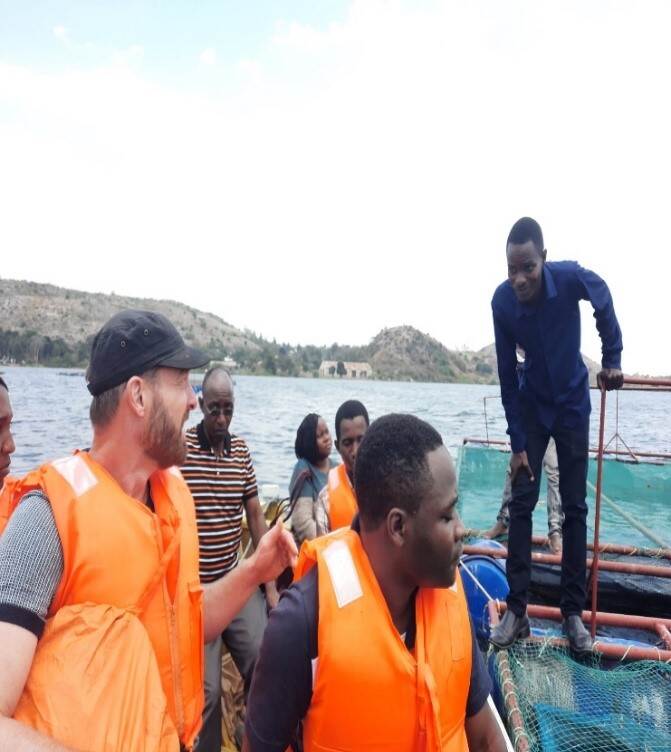Aquaculture training in Tanzania for FETA
Both the Tanzanian and Dutch government recognize the potential of aquaculture in Tanzania. And the two countries actively cooperate in the sector. In this regard a Tailor Made Training (TMT+) was awarded in September 2021 for farmers and teachers of the Fisheries and Education Agency (FETA).
Larive International organized the TMT+ training on aquaculture at the Fisheries and Education Agency (FETA) campuses in Bagamoyo and Mwanza. At each location, 20 trainees consisting of a mix of FETA teachers and farmers participated. In this way, knowledge exchange is encouraged, helping to improve food security in Tanzania. Trainers of Lattice Aqua, Til Aqua, Holland Aqua and independent trainer trained farmers on a large variety of topics to make the sector more sustainable.

The Netherlands is a global leader in the aquaculture sector. As a small country which is situated in a river delta and bordering the North Sea, sustainable aquaculture is a priority. The Dutch recirculated aquaculture technology (RAS) is world-renowned for its efficiency. Both the Tanzanian and Dutch government recognize the potential of aquaculture in Tanzania. The Netherlands has been actively supporting the aquaculture industry of Tanzania since 2018. This resulted in the aquaculture impact cluster demo farm that is established in Kigamboni. Through the transfer of knowledge to Tanzanian aquaculture stakeholders, sustainable growth is supported. The TMT+ program allows for such knowledge transfer, linking Tanzanian training institutes to Dutch knowledge.
Selection and intensification of production systems
As many farmers have difficulty becoming profitable and deal with limited natural resources, a training was given on the advantages on both intensive recirculation systems and semi-intensive cage systems. Besides learning theory, trainees practiced the basics of system design to ensure they understood the systems thoroughly. Cage farms are relatively cheap and easy to operate. They can hold large amounts of fish without depending on electricity. This makes them suitable for farming in remote locations and in natural water bodies. Although the intensive recirculation systems are more complex and require a higher initial investment, a farmer can produce more fish in the same amount of water lowering the environmental impact and amount of labor needed for production. Also in these systems fish will grow faster and utilize their feed more efficiently.
Trainees learned pros and cons for each system and how to select a production system for their specific situation. As there are still many opportunities for catfish farming in Tanzania.During the training the trainees learned all essential steps in catfish production, including production planning, reproduction and production techniques.
Hatchery
Many farmers indicated it is difficult getting quality fry for their farm. The trainees therefore received information on all the basic steps in hatchery production. Also in hatchery production there are clear advantages in using intensive production systems. In the early stages, the fish are more vulnerable. A controlled environment in recirculation systems combined with proper nutrition can increase the survival of the fish and ensure better health among the entire growth cycle, even if the fish move to more traditional production systems in a later phase.

Practical training and field visits.
The training was practical in nature, including field visits. For example, the trainees visited the Ruvu fish farm. During this visit, they practiced doing water quality tests and learned how to assess the entire production cycle and improve production practically. In Mwanza, the SAMEKI fish farm was visited. Here they could see the operations of ponds and cages in a real-life setting. Installation of the system, including practical advantages and disadvantages, were discussed. Further, trainees had an in-depth discussion on water quality in the lake and how this influences production.
Future implementation.
Parallel to the training, Zone College worked together with FETA staff members to strengthen their current curriculum, embedding the training topics within it, so that the training will serve the industry also in the long-term.
All participants showed great enthusiasm about the possibilities for Tanzanian sustainable best practices in the aquaculture sector. Trainees underscored that the best practices and innovations discussed in the training will make the industry more sustainable for the future. Utilizing modern farming techniques will more profitable while increasing food security in the future, and will especially be a chance for youth to work with new innovations and use their new insight to improve the sector.
This TMT+ training was funded through the Orange Knowledge Program of NUFFIC and the Dutch Ministry of Foreign Affairs. The Orange Knowledge Program aims at narrowing the gap between TVET colleges and the industry by sharing knowledge of its project partners.
For any questions for the agricultural department, feel free to contact us via dar-lnv@minbuza.nl. For the latest updates on activities, new articles and more follow us on twitter on @NLAgiTanzania and you can subscribe to our newsletter by sending us an email. Also read more information through our website Tanzania | Landeninformatie | Agroberichten Buitenland and FoodTechAfrica click this link.